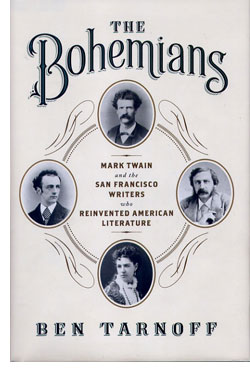 |
 |
 Ben Tarnoff
Ben Tarnoff
The Bohemians: Mark Twain and the San Francisco Writers Who Reinvented American Literature
Penguin Press/ The Penguin Group
US Hardcover First Edition
ISBN 978-1-594-20473-9
Publication Date: 03-20-2014
342 Pages; $27.95
Date Reviewed: 05-03-2014
Reviewed by: Rick Kleffel © 2014
Index:
Non-Fiction
Written histories are themselves a piece of history, as much a document of their own time as those they examine. Happily, the early 21st century appears to have been an ideal moment for Ben Tarnoff to look at 'The Bohemians: Mark Twain and the San Francisco Writers Who Reinvented American Literature.'
Tarnoff's narrative of a nascent cultural revolution is chock-a-block with verve and reverb. He finds an engaging through-line full of fun stories about a culture in the midst of tumultuous and familiar-feeling change. Apparently, we're unlikely to run out of barriers to break down no matter how decisive any given victory feels.
Even the three stages of change that structure the book ring close to home; "Pioneers," "Bonanza and Bust," and "Exile." As you read, skip "Oh, Susanna" for your soundtrack and go straight to the Rolling Stones. Early on, it becomes clear that Mark Twain, Bret Harte, Charles Warren Stoddard and Ina Coolbrith were their own brand of rock stars, making use of new technology to splash out their artistic visions and just as importantly, amp up their fame and make some money.
Twain's the lead here, even if it's mostly early days for him in this slice of time. Tarnoff brings Twain, Harte, Stoddard and Coolbrith together in the opening sections of the book, each of them young, uncertain (some more than others) but driven to succeed in a new landscape where it's possible to make a living as a writer. Not a good living necessarily and not as easy one. Tarnoff's story charts not just the stories of these writers, but the larger cultural and literary landscape that itself was unsettled.
The primary strength of Tarnoff's book lies in his ability to craft a gripping story around history we sort-of know by bringing up the details of what we don't know. His prose is clean and crisp and he has a great sense of pacing and plotting. The book has a palpable sense of tension as we see these very diverse personalities, meet, form friendships and then blow up and out into the world at large.
Tarnoff is also an expert at writing about the past in a manner that suggests the present without needing to mention it explicitly. The Bohemians embodied the still lively clash between the East and West coast literary establishments, and they came together in an unprecedented bust of literacy and literary publication. Tarnoff describes situations that let his readers make their own parallels to the present, which makes reading the book quite enjoyable.
The other strength here is Tarnoff's strong sense of characterization, of both his people and the places. Without allusions or anachronisms, he makes these men and women seem thoroughly modern. His ability to transport us in time so convincingly derives from his ability to use the language of now to create for us then. We feel a real kinship to these people, and you'll care about them long after you finish the book.
'The Bohemians' is a fascinating raft of stories, an ark stuffed with tales of lives that might seem like the tall tales told by those in the narrative. Tarnoff's concise vision ensures that the book has all the drive of a novel. He uses the most modern implements of cultural histories to bring to his work the kind of excitement he portrays in the work. Twain's literary landscape was embroiled in change just as profound as that which surrounds us now. The trick of 'The Bohemians' is to let its readers be two places at once.
|
 |
|
|
 |
| |
Review Archive
All Reviews alphabetized by author.
General Fiction
Non-Genre, general fiction and literature.
Horror
Supernatural fiction, supernatural horror and non-supernatural horror.
Science Fiction
Science fiction, science fantasy, speculative fiction, alternate history.
Fantasy
Fantasy, surrealism and magic realism.
Mystery
Crime, thrillers, mystery, suspense.
Non-Fiction
Non-Fiction, True Crime, Forteana, Reference.
Poetry
|
|
 |
|




